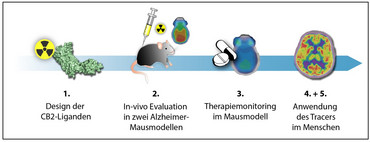The endocannabinoid system as target for therapy and diagnostics in Alzheimer's dementia (CanAD)
Research group of the Department of Psychiatry and Psychotherapy
The endocannabinoid system (ECS) is an endogenous physiological regulatory system that is evolutionarily highly conserved. The ECS consists of cannabinoid receptors, their endogenous ligands, and enzymes for synthesis and degradation of endocannabinoids. So far, two types of cannabinoid receptors have been identified: CB1 receptors are mostly expressed by nerve cells in the CNS, while CB2 receptors are mainly located on cells of the immune system and on microglia.
The ECS is involved in various physiological functions, including memory, brain development, and motor control (Salzet et al. 2000). Endocannabinoids are synthesized on demand and play a role in neuroinflammatory responses, presynaptic activity, and have neuroprotective and antioxidant functions in the brain (Mechoulam and Parker 2013; Fagan and Campbell 2014). Therefore, a modulation of the endocannabinoid system opens up new therapeutic possibilities for the treatment of neurodegenerative diseases including Alzheimer's disease (AD).
Selection of current projects
The endocannabinoid system as a target for new therapeutic approaches in Alzheimer's disease
The limited therapeutic effects of current treatments for AD highlight the need for new research approaches. In a current research project, we are investigating the therapeutic potential of a cannabinoid-based therapy for AD in different mouse models. The purpose of this study is to investigate the potential therapeutic qualities of different cannabinoids with respect to slowing or halting the characteristic hallmarks of AD including Abeta plaque pathology, cell loss, cerebral hypometabolism, and cognitive deficits. In addition, a cannabinoid-based clinical study is planned.
Influence of cannabinoids on the healthy organism
In addition to the use of cannabinoids as a possible therapy for AD, we also study the effects of different phytocannabinoids and synthetic cannabinoids on the healthy organism. For example, in a recently published article, we were able to show that long-term treatment with cannabidiol has no negative effects on memory performance and anxiety behavior in healthy mice (Schleicher et al., 2019).
New PET tracers for Alzheimer's disease

It has been shown that CB2 receptors are strongly upregulated in the brains of patients with AD (Benito et al. 2003; Solas et al. 2012). Therefore, CB2 represents an ideal target structure for early and non-invasive diagnosis of AD. The aim of this project is the development of new positron emission tomography (PET) tracers for imaging CB2 expression in the brain of AD patients.
Suitable CB2 ligands with a high affinity and selectivity for the CB2 receptor will be radiolabelled and first evaluated in different mouse models for AD. In addition, CB2-PET/CT will be used to evaluate in vivo the success of different therapeutic strategies in AD mouse model.
Collaboration
Internal:
- Priv.-Doz. Dr. Caroline Bouter, Senior Physician, Clinic for Nuclear Medicine
External:
- Dr. Nicola Beindorff, Head of "Berlin Experimental Radionuclide Imaging Center (BERIC)", Charité Berlin
PhD Students
- Berfin Altunok
- Sören Bock
- Timon Franke
- Nina J. Horkulak
- Caroline Irwin
- Maximilian J. Löw
- Malte Maßmann
- Johanna Möller
- Frederik W. Ott
- Paula Pfeifer
- Georg Ratke
- Ann-Katrin Sandtmann
- Friederike Spandau
- Wanda Vicktor
- J. Moritz Wagner
Contact
Research group leader
PD Dr. Yvonne Bouter
Tel.: +49 551 3965248
yvonne.bouter(at)med.uni-goettingen.de